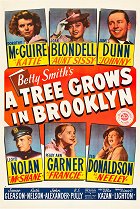Directed by:
Elia KazanCinematography:
Leon ShamroyComposer:
Alfred NewmanCast:
Dorothy McGuire, Joan Blondell, James Dunn, Peggy Ann Garner, Lloyd Nolan, James Gleason, Ted Donaldson, John Alexander, Alec Craig, Gloria Talbott (more)Plots(1)
The story centers on young Francis Nolan, whose father's sudden death leaves the family to somehow survive in a harsh, desperate time. Like the tree in the back of their house, uncared for and forgotten, their struggle to survive is a valiant one. (official distributor synopsis)
Reviews (2)
A typical product of its time and the American studio system. Actually, not quite typical - it belongs to the better part of production thematically influenced by the economic crisis and stagnation of the 1930s. The quality of The Grapes of Wrath or even the European neorealist school of De Sica's films was not achieved by mistake. Not so much because of Elia Kazan, as he was already a very good director back then and worked reliably, led the actors well, and skillfully managed the whole crew, but rather considering the qualities of the screenplay and the texts derived from it. It is sometimes so pathetic and noble as if it came from the mouths of Salvation Army members. The dialogues are in the style of: "Kate, I know you're a great girl", "You have such wonderful and brave children", "Your Johny is a great guy", "We all love you", and "You are such a kind person". One would crumble from this and then go on to give away their belongings to the poor. Sometimes - actually quite often - it is overly melodramatic with a typical happy Hollywood ending. The American view of poverty is also typical. It is not a product and flaw of the system that needs to be addressed systemically with political means, it is simply an individual's failure - they didn't work enough and drank too much. You need to seek more advice and contribute more to charity. Apart from the book dialogues, and the aforementioned shortcomings, there remains quality acting and direction, which deserve an overall impression of 45%.
()
I like these old movies that I basically know nothing about, but they manage to captivate me. Elia Kazan was a good director, he quite liked the lower class, which he frequently portrayed in his films, and he focused on the poor this time as well. It's melodramatic, but it's moving and it's human. A similar movie today would be just kitschy.
()

